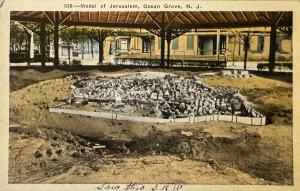There were thousands of faces staring down at Judy Kopelow at the Holocaust museum in Washington, D.C., but she only saw two.
They were young but determined. Fresh-faced but defiant. They weren’t Jewish but they had earned a place in the museum’s exhibit about non-Jews who had fought against the Nazi regime.
They were casualties of The White Rose, but Kopelow didn’t know that when she visited the exhibit several years ago. All she knew was their names – Hans and Sophie Scholl.
“There was a charm about them. They seemed young and they had a spirit,” Kopelow said of their photo.
“It sounds so corny, but I just loved them. I wanted to know who they were – there was something about them.”
And so she searched, unearthing every book about the Scholls that she could find. Soon she learned that they were students at the University of Munich who were involved in an anti-fascism group at their school between 1942 to 1943 called The White Rose. The movement was an intellectual protest that spread its message through leaflets. The Scholls were eventually caught for handing out the leaflets and were executed by the Nazis.
Through her research, Kopelow also found out that an opera had been written about their story by Udo Zimmerman.
“I came back to Toronto and went to Sam the Record Man in the classical record department. By chance they had two copies of the opera,” she said. “I listened to it and was just very, very moved by it… I just thought the story had to be told.”
Kopelow set about telling it. She began producing the opera, White Rose, which follows the Scholls’ life story, and she will bring it to the University of Toronto’s Hart House on April 8.
“Besides the music being very, very beautiful, yet tragic, it’s a testament to the strength of the human spirit,” she said, adding that she first produced White Rose about six or seven years ago. “However dark the evil force might be, there always seem to be those that rise against it.”
Kopelow brought the play to the University of Toronto about five years ago and thought it was time to bring it back. She approached Hillel of Greater Toronto and the Centre for Jewish Studies at U of T, and it didn’t take Hindy Najman, the centre’s director, long to agree.
“My response was, ‘Let’s do it,’” Najman said, adding that she taught students about The White Rose movement. “I visited Munich, I saw the homes of Hans and Sophie Scholl. [The opera] is a very powerful narrative, it’s a very tragic narrative, but we’re reminded about what we should be called upon to do in moments of loss and tragedy.”
For Doris Bergen, the chancellor of the Rose and Ray Wolfe chair in Holocaust studies, the opera is about more than just Holocaust education.
“People think White Rose was an anti-Holocaust resistance. That’s part of it,” she said. “In general, they were protesting the crimes of Nazi Germany. They were protesting a barbaric way of waging warfare.”
Bergen thinks it’s appropriate that Kopelow took the opera to a university.
“It’s important for students to think about the way that… a group of students… tried to organize an intellectual protest. I think it’s really important to have that challenge to students,” she said. “It’s really a challenge to the university as a whole. When [Hans and Sophie] were executed, not a single representative of the university came to their defence. It’s a story of heroism, but it’s a heroism that really highlights the much broader sort of failure [of universities].”
For Kopelow, opera is a good way to tell this story.
“People talk to me about why [have an] opera. It’s because… an operatic voice is so powerful. You can’t get your head around where that strength could come from,” she said.
White Rose will be performed April 8 at 7:30 p.m. at Hart House. For tickets or more information, call 416-913-2424.






